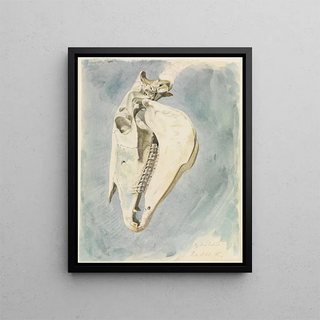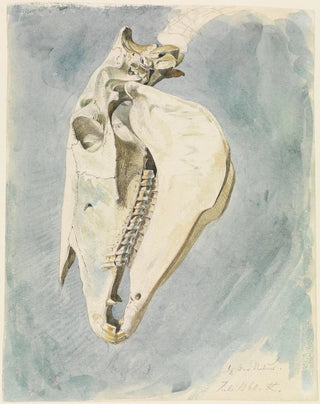Art print | Study of an animal skull - Ferdinand Keller


View from behind

Frame (optional)
In the fascinating world of art, some works manage to capture the very essence of life and death. "Study of an animal skull - Ferdinand Keller" is part of this tradition, offering a profound reflection on the ephemeral nature of existence. This piece, both simple and complex, invites the viewer to contemplate the beauty and fragility of animal life through the lens of form and texture. By focusing on this skull, Keller does not merely depict an inanimate object but evokes the memory of a living being, an echo of past stories and vanished ecosystems. The art print of this work allows not only for appreciation of the artist's technical virtuosity but also initiates a reflection on our relationship with the natural world.
Style and uniqueness of the work
Ferdinand Keller's work stands out for its meticulous and realistic approach. In "Study of an animal skull," every detail is carefully observed and rendered, revealing an unmatched mastery of representation. Shadows and lights intertwine to bring the bony structure to life, while the texture of the skull seems almost tangible. Keller manages to transcend a simple anatomical study to create an art piece that evokes emotion and contemplation. The choice of subject, a skull, far from being macabre, invites reflection on the inherent beauty of nature and the necessity of preserving our environment. Thus, the work is part of an artistic tradition that celebrates nature while questioning our relationship with it.
The artist and his influence
Ferdinand Keller, a 19th-century artist, is often recognized for his ability to marry science and art. Trained at the Academy of Fine Arts, he established himself in the artistic world thanks to his naturalistic studies. Keller is interested in the precise representation of living forms, and his work on animal skulls is a perfect illustration. His influence extends beyond his era, inspiring many contemporary artists who seek to explore the relationship between man and nature.

Matte finish

View from behind

Frame (optional)
In the fascinating world of art, some works manage to capture the very essence of life and death. "Study of an animal skull - Ferdinand Keller" is part of this tradition, offering a profound reflection on the ephemeral nature of existence. This piece, both simple and complex, invites the viewer to contemplate the beauty and fragility of animal life through the lens of form and texture. By focusing on this skull, Keller does not merely depict an inanimate object but evokes the memory of a living being, an echo of past stories and vanished ecosystems. The art print of this work allows not only for appreciation of the artist's technical virtuosity but also initiates a reflection on our relationship with the natural world.
Style and uniqueness of the work
Ferdinand Keller's work stands out for its meticulous and realistic approach. In "Study of an animal skull," every detail is carefully observed and rendered, revealing an unmatched mastery of representation. Shadows and lights intertwine to bring the bony structure to life, while the texture of the skull seems almost tangible. Keller manages to transcend a simple anatomical study to create an art piece that evokes emotion and contemplation. The choice of subject, a skull, far from being macabre, invites reflection on the inherent beauty of nature and the necessity of preserving our environment. Thus, the work is part of an artistic tradition that celebrates nature while questioning our relationship with it.
The artist and his influence
Ferdinand Keller, a 19th-century artist, is often recognized for his ability to marry science and art. Trained at the Academy of Fine Arts, he established himself in the artistic world thanks to his naturalistic studies. Keller is interested in the precise representation of living forms, and his work on animal skulls is a perfect illustration. His influence extends beyond his era, inspiring many contemporary artists who seek to explore the relationship between man and nature.






